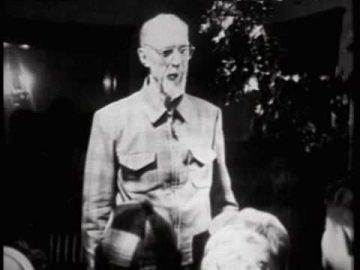(I highly recommend teachers either buy or download Words of Wisdom: A Collection of Quotes for LDS Women to supplement this lesson. The book has many wonderful quotes by LDS women leaders about Jesus, and using some of them throughout will enhance the lesson. Another word of advice to you teachers out there: get on Amazon and buy some Chieko Okazaki books. She invariably has something insightful to say on almost any topic. Aloha is one of my favorites. You can find copies for $.01 plus shipping. And finally, please read this post about George Albert Smith’s battle with debilitating depression. Bringing in some points about his struggle with depression might be very important for women in your ward to hear.)
Introduction:
If your building has internet access, consider showing a two minute clip of George Albert Smith sharing his testimony of Jesus. His preaching has an energy which would be fun for the class to see. Also, consider showing the first 45 seconds of this George Albert Smith video, which starts out with him preaching and shows his sense of humor. It also highlights one of the best George Albert Smith quotes I’ve heard: “I would not be an enemy to any living soul.”(Cited in Bryant S. Hinckley, “Greatness in Men: Superintendent George Albert Smith,” Improvement Era, Mar. 1932, p. 295.)
Section I: From the Life of President Smith
(You may want the class to read parts of this anecdote on p. 21) He recounts hearing a woman in a train station telling someone that she had gone to an LDS service the evening before. Her overwhelming impression from that meeting was that Mormons believe deeply and profoundly in Jesus.
Sometimes, however, people might not come away from our meetings with that impression. My husband was ward mission leader years ago. They were teaching an investigator, focusing very much on Jesus, and convinced her to come to church. That day the Sacrament Meeting was focused on the history of that particular ward, and there was no mention of Jesus. She never came back, saying that she had joined a church that talked about Jesus.
Would people investigating the Church today who come to our meetings come away with an impression similar to the woman’s in the train station? Why or why not? Is there anything we Church members can do to make our meetings more Jesus focused?
Section 2: Jesus Christ, Son of God
“I have found many in the world who have not known that we believe in the divine mission of our Lord, and I have been led to say upon more than one occasion that there are no people in the world who so well understand the divine mission of Jesus Christ, who so thoroughly believe him to have been the Son of god… as the Latter-day Saints.” p. 22
Clearly, he was very concerned with this issue of public perception of Mormons, particularly perceptions that Mormons were not believers of Christ. Do you encounter this today? How do you respond to people who say this? What can we do to fix that perception?
“The Redeemer of mankind was more than a good man who came into the world to teach us ethics… He was indeed the Son of God.” p. 23
“The question has been raised in the old world that Jesus was not of divine origin, because He was born as a little child, cradled in a manger, His mother being Mary and his reputed father Joseph the carpenter. Many have admitted that He was a great and good man, but they have desired to rob Him of the divinity of His birth.” p. 25
Smith emphasized the divinity of Jesus Christ repeatedly in this chapter, as he does in the above quotes. It’s interesting to place this line of thinking in its historical context. At the time of this quote, in 1920’s, historical criticism of the Bible was becoming more and more popular. Some scholars were de-emphasizing Jesus’ divinity and redemptive role and focusing instead on the moral lessons he taught in the New Testament. Smith clearly is invested in testifying of Jesus’ divine role as the Redeemer of all humankind.
When you think of the things that you find most compelling about Jesus and the Jesus story, what draws you the most?
- Are you most attracted to the redemptive promises of the atonement, that we can go back to God through repentance and Jesus’ sacrifice? (this seems to be Smith’s main interest in Jesus.)
- Are you most attracted to the stories of Jesus modeling for us a godly love for the least of humanity, a love that we should exemplify in our lives?
- Are you attracted to the symbolic quality of the Jesus story, one that speaks to the possibility of transformation and change?
- Is it the idea that Jesus understands and sympathizes with our pains and afflictions and weaknesses — and loves us anyway — that draws you to the Jesus story?
- Why does that particular aspect compel you particularly?
(The quotes on Jesus in the Words of Wisdom book can reinforce and illuminate some of these various aspects of the Jesus narrative. Also, you may want to consider asking a couple of women beforehand to pick one of these aspects of the Jesus story to talk about for 2 or 3 minutes.)
Section 3: The Book of Mormon and testimony of Joseph Smith
“To my mind one of the strongest testimonies of the divinity of the life of our Savior is the testimony of Joseph Smith who laid down his life as a witness of the truth of the gospel of Jesus Christ.” p. 27
Why do you think Smith thinks that Joseph Smith’s is one of the strongest testimonies of Jesus? Is there anyone else’s testimony of Jesus that you have found particularly compelling or important?
Section 4: Our Mission is the Share What We Know About Jesus
“I say to you Latter-day Saints, there are no other people in all the world who have all the information that we have with reference to the divinity of the Savior; and if we did not believe in Him we would be under greater condemnation than the others that have never had that information.” p. 29
We see here the idea that the more knowledge we have, the more responsible we are. In your opinion, what particular knowledge of Jesus do we LDS have that other Christian faiths don’t have?
“And now, I adjure you as your brother, plead with you as one of the humblest among you, do not hide your candle under a bushel. Do not conceal the knowledge God has bestowed upon you from your fellows. Do not annoy them, but do not be unwise enough as to hide from them the gospel of Jesus Christ.” p. 29
How do we not hide our candle, but at the same time not annoy others? Do you have experience with navigating this?
There are lots of possible answers to that question. I like what he says later on the page: “…it is not with egotism, it is not with arrogance, but with charity for all, with loving tenderness, that this message is sent forth.” p. 29. This might be one good answer. I think another one that touches on what Smith said would be an honest conversation, in which we listen to our neighbors and respect and attempt to understand their beliefs. I like the idea of an equal exchange, where both parties are interested and learning, rather than approaching our neighbors with the attitude that we know more than they do.
Closing:
Have someone read the quote below.
“As a young priest traveling in Italy in 1833, Englishman John Henry Newman encountered emotional and physical darkness when illness detained him there for several weeks. He became deeply discouraged, and a nurse who saw his tears asked what troubled him. All he could reply was that he was sure God had work for him to do in England. Aching to return home, he finally found passage on a small boat. Not long after the ship set sail, thick fog descended and obscured the hazardous cliffs surrounding them. Trapped for a week in the damp, gray darkness, the ship unable to travel forward or back, Newman pled for his Savior’s help as he penned the words we now know as the hymn, “Lead, Kindly Light.” This hymn echoes a truth our hearts confirm: though trials may extinguish other sources of light, Christ will illuminate our path, “keep our feet,” and show us the way home. For as the Savior has promised, “he that followeth me shall not walk in darkness” (John 8:12).” Virginia U. Jensen, Relief Society Presidency, “Lead, Kindly Light.” Ensign, November 2000.
Comment on these points – that Jesus is with us in our darkest moments, loving us and willing us to choose the better part. That he knows our trials and offers us love, comfort, and new life amidst our trials.
Sing “Lead, Kindly Night” hymn 97 for the closing song.
Please share your lesson ideas with us!







5 Responses
Caroline,
Would you consider departing from the manual to bring in Pres. Smith’s battle with depression?
Absolutely! In fact, stay tuned. On Friday we’ll have a guest post which features Smith’s battle with depression. I’ll put a link up on this lesson post to that one so that teachers can have that background info and consider adding it in to the lesson.
I love the candle under a bushel quote. I wonder if it could be used to have a discussion about the less flashy gifts of the Spirit that we don’t always talk about and how those gifts can build the kingdom as much as teaching, speaking in tongues, etc.
…because I’ll try to squeeze a little gifts of the Spirit into any lesson I can 🙂
Thank you for this. I just received a call today to be the RS second Sunday teacher and I needed a little guidance as to where to start with this lesson. I found this extremely helpful and I appreciate all you do!
Mahalo
When I first read this lesson I was immediately struck by how it reminded me of a quote by C.S. Lewis from Mere Christianity.
I am trying here to prevent anyone saying the really foolish thing that people often say about Him: ‘I’m ready to accept Jesus as a great moral teacher, but I don’t accept His claim to be God.’ That is the one thing we must not say. A man who was merely a man and said the sort of things Jesus said would not be a great moral teacher. He would either be a lunatic — on the level with the man who says he is a poached egg — or else he would be the Devil of Hell. You must make your choice. Either this man was, and is, the Son of God: or else a madman or something worse. You can shut Him up for a fool, you can spit at Him and kill Him as a demon; or you can fall at His feet and call Him Lord and God. But let us not come with any patronizing nonsense about His being a great human teacher. He has not left that open to us. He did not intend to. – Mere Christianity, pages 40-41.
I’m not sure how I’m going to work it in yet. But I think I will.